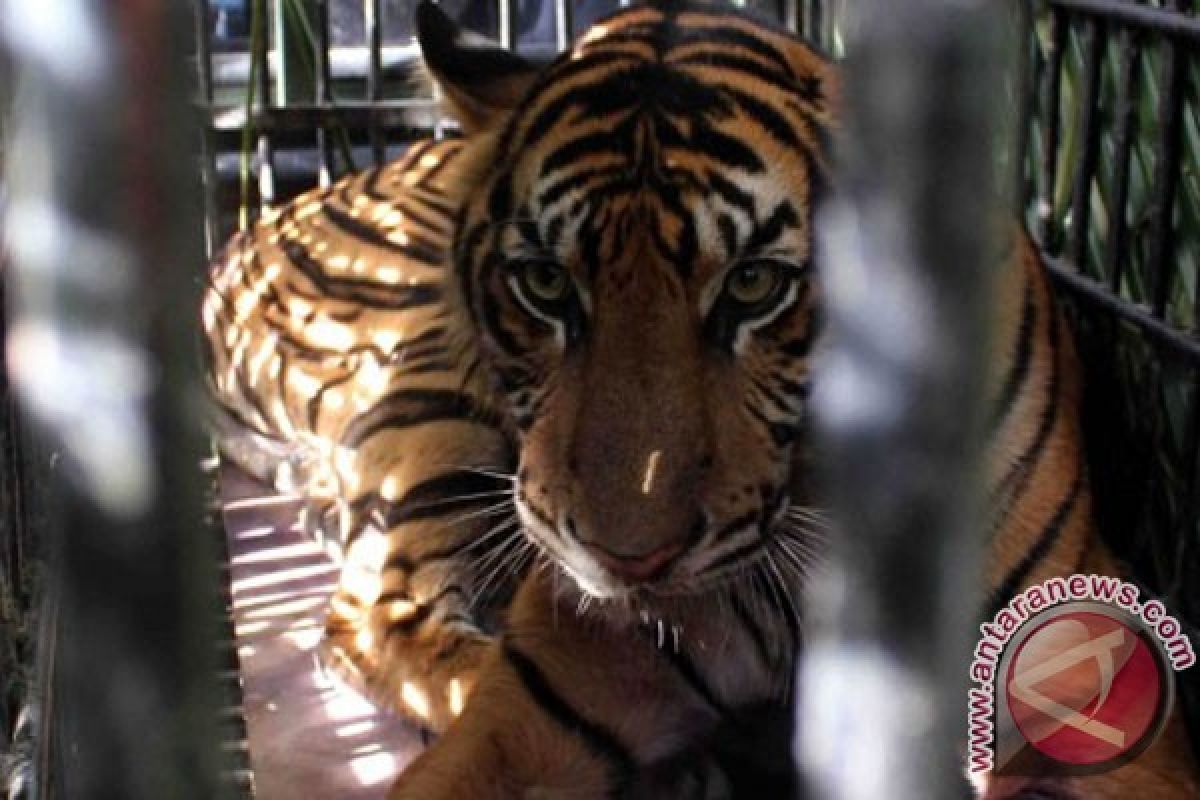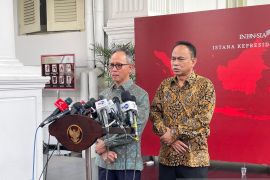"The main reason is that demand for this rare animal`s body parts is still high," a staff member of Wildlife Conservation Society-Indonesian Program (WCS-IP). Zahra Afifah, said.Jakarta (ANTARA News) - The poaching of Sumatran tigers (Panthera Tigris Sumatrae) for trading remains a serious threat to the survival of the rare, protected animal.
One of only six subspecies of tigers that survive today, Sumatran tigers are found only on the island of Sumatra and are classified as critically endangered.
Accelerating deforestation and rampant poaching mean this noble creature could sooner or later end up like its extinct Javan and Balinese relatives.
Despite increased efforts in tiger conservation, including strengthening law enforcement and anti-poaching capacities, a substantial market remains in Sumatra and the rest of Asia for tiger parts and products.
Sumatran tigers are losing their habitat and prey fast, and poaching shows no sign of decline.
Rampant poaching in the Bengkulu province has led to a rapid decline of the population of Sumatran tigers, and it is estimated that there are only 17 left.
Abu Bakar, chief of the Natural Resources Conservation Agency (BKSDA) for the provinces of Bengkulu and Lampung, has confirmed that the population of this endangered species in Bengkulu region is estimated to be 17.
According to him, poaching and trading of tiger body parts are major threats to the preservation of the endangered species, despite increased collaboration between law enforcement officials to fight these illegal practices.
In Bengkulu, BKSDA officials recently seized the skin of a Sumatran tiger from illegal traffickers.
Abu Bakar remarked in Bengkulu on Wednesday that the evidence, in the form of a two-meter-long Sumatran tiger skin and bones, was confiscated from two illegal traffickers, identified as Awaludin and Samian, residents of North Bengkulu.
Both perpetrators have been sentenced to three and 3.5 years of imprisonment, respectively, and a fine of Rp50 million has been imposed by a panel of judges of the Argamakmur District Court.
"The ruling in the case was carried out in the Argamakmur District Court, and we are currently seeking time to destroy the evidence," Bakar stated.
According to Bakar, the law enforcement process in cases of poaching of Sumatran tigers and trading of their body parts is getting better, and the verdicts for such perpetrators are getting stricter.
"The maximum verdict of a four-year sentence was awarded to illegal hunters from Mukomuko," he revealed.
The destruction of the confiscated tiger skin will be witnessed by representatives from the Argamakmur District Court, Argamakmur Resort Police, and the AGO`s Natural Resource Sector Office, as well as staff of the Wildlife Conservation Society-Indonesian Program (WCS-IP).
Zahra Afifah, a staff member of WCS-IP, noted that illegal hunting is a major threat to the preservation of endangered species in Indonesia, including the Sumatran tiger.
"The main reason is that demand for this rare animal`s body parts is still high," Afifah pointed out.
Hence, the involvement of all agencies to combat the trade of protected wildlife should be increased, including the active role of the community.
Earlier in October last year, police in Jambi province and local BKSDA officials in the Berbak National Park apprehended Marsum (45), a resident of Tanjab Timur District, and seized a tiger skin and some tiger bones from him.
Jambi Police spokesman Senior Commissioner Ahmad Haydar stated that Marsum was questioned as a witness, but it was possible that his status would be upgraded to a suspect if the investigators found any evidence of criminal activity.
Haydar pointed out that Marsum had admitted to having hunted the Sumatran tiger, using a 900-meter live electric wire to capture the rare, protected animal.
The tiger captured by Marsum was a female and was only about two years old. The perpetrator admitted that he would have sold the Sumatran tiger skin for Rp105 million, but before he could make a transaction with a buyer, he was apprehended.
Rampant poaching, coupled with the opening of massive plantation areas and forest fires, has led to a continual drop in the number of Sumatran tigers.
The Sumatran tiger is one of the last remaining tiger species in Indonesia after the Balinese and Javanese species were declared extinct, but now, its existence is under threat because its habitat has shrunk and it is being hunted for trading.
Previously, Indonesia Environment and Forestry Ministry (KLHK) officials had apprehended two men in possession of a Sumatran tiger skin in Indragiri Hulu District, Riau Province.
The two men, known by their initials AH (51) and JO (35), were carrying an intact Sumatran tiger skin, which was seized as evidence.
After a two-week coordination effort between the KLHK, Jambi Natural Resources Conservation Agency, and the World Wildlife Fund (WWF), and reconnaissance in Jambi, the officials apprehended the duo.
WWF said there was still a substantial market in Asia for tiger parts and products.
The confiscated Sumatran tiger skin was some two meters long, with no defects from head to tail, indicating that the poachers were professionals.
A South Sumatran police team early last year caught a man named Suharno, alias Reno, a trader in Lubuklinggau city, South Sumatra.
He was in possession of a tiger skin measuring 120 cm in length in a plastic bag containing preservatives and some tiger bones weighing two kilograms.
The man claimed to have received the tiger parts from a tiger hunter in Jambi.
An intact tiger skin fetches anywhere between Rp50 million and Rp100 million, depending on its size and condition.
Suharno was sentenced by the district court of Palembang to six months in jail, while he could have been given a maximum sentence of five years and fined Rp100 million, based on Law Number 5 of 1990 on Ecosystem and Conservation of Living Natural Resources.
(T.O001/A/KR-BSR/A/H-YH)
Reporter: Otniel Tamindael
Editor: Heru Purwanto
Copyright © ANTARA 2018












